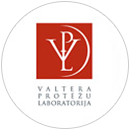Ocular prostheses

VALTERS’ PROSTHETIC LABORATORY
Postoperative eye prosthesis from collection
| Postoperative eye prosthesis from collection | 93.00 EUR |
Eye prosthesis from cryolite glass
| Eye prosthesis from cryolite glass | 350 - 450 EUR |
Eye prosthesis from PMMA materials (plastic)
| Eye prosthesis from PMMA materials (plastic) | 600 - 700 EUR |
Orbital area ecto prosthesis
| Orbital area ecto prosthesis | 1720 EUR |
Postoperative eye prosthesis from collection
If no complications are observed after the eye removal surgery, ocular prosthesis can be inserted already on the 5th -7th day.
In special occasions postoperative prosthesis can be inserted also in 3-4 weeks after the surgery.
When the oculist has selected the most suitable prosthesis for the respective eye cavity from the range of ocular prosthesis, it must be used for 1.5 – 2 months. In this period the postoperative scars heal completely and the shape of the eye cavity remain unchanged for the following years. Therefore after the established period of time the individual ocular prosthesis must be made for permanent use which will last 2 years for an adult.
Procedure takes 15 up to 30 minutes.
Double-wall eye prosthesis from cryolite glass
Double-wall glass prosthesis has comparatively thin walls (0.3 – 0.5 mm on average), between which a comparatively extensive closed vacuum area is located. This particular prosthesis is used after an eyeball removal surgery (enucleation).
Single-wall eye prosthesis from cryolite glass
Single-wall glass prosthesis is selected, when the patient has a remaining eye membrane or atrophic eyeball, as well as when the entire eyeball has been maintained and the frontal central part has gross opacity and the eye is blind. In such case the prosthesis masks the opacity and it is put like a lens on the maintained eyeball. Single-wall eye prosthesis is used also when after an eye removal operation an implant is set in patient’s eye cavity for preventing facial defects and ensuring synchronous movements of the prosthesis and the healthy eye. Making a single-wall glass prosthesis is complicated; it requires much more attention and professionalism than making a double-wall glass prosthesis.
Production time 1 day.
Eye prosthesis from PMMA materials (plastic)
Taking into account patient’s individual traits and specific characteristics of the eye cavity, the prosthetist makes individual ocular prosthesis from previously prepared shape of the orbit cavity using a synthetic polymer material (PMMA).
Both thin and thick ocular prosthesis are made from a synthetic material. Unlike the cryolite glass prosthesis, this particular prosthesis is made from a monolithic mass. It is more durable, its weight is often heavier, and its coefficient of getting wet is smaller.
It takes a 3 days to make a PMMA ocular prosthesis. The prosthesis must be changed every two years, and the prosthesis must be polished at a specialist once during the period of wearing.
Production time 1-3 days.
Orbital area ecto prosthesis
Ecto prosthesis is an orbital prosthesis, to which artificially made eyelids are attached to cover a facial defect in the orbital area. Such prosthesis is needed in several cases:
- after surgical removal of eyeball together with both eyelids or eyeball with partial evacuation of the orbit content, when a marked scar of eyelids and mucous membrane develop due to radiating the scar, and as a result of which the regular prosthesis does not last in its place, since no socket has remained in eyelid arches;
- after traumatic damage to the eyeball and eyelids and when inserting the cosmetic ocular prosthesis is impossible due to a missing socket.
Special material of the prosthesis is individually adjusted to the curves of facial bones and color of the skin. Artificial eyelids with lashes and suitable reproduction of eyeball is made in the middle of the ecto prosthesis. Ecto prosthesis is made of plastic and attached to facial skin with a special adhesive. A very natural effect can be achieved by applying a little make-up.
Production time up to 5 days.
For more information, visit our website http://www.vpl.lv/eng/

